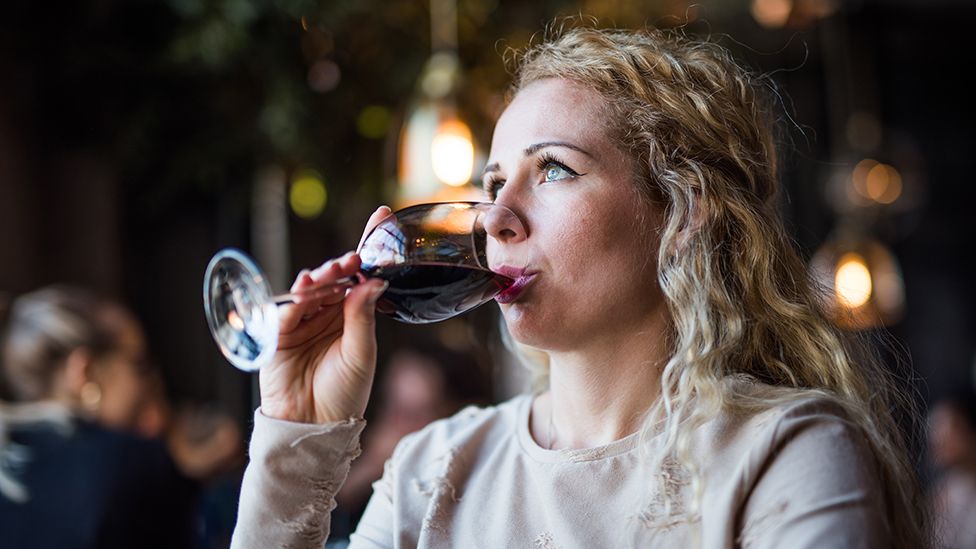Removing large wine measures cuts drinking by 7.6% in study
- Published
- comments

With the largest measure off the menu, more medium and small glasses of wine were sold
Removing the largest glass of wine from sale cuts the total amount people drink by 7.6%, a four-week trial in 21 pubs, bars and restaurants suggests.
With the largest measure, 250ml - equal to a third of a bottle - off the menu, more 125ml and 175ml glasses of wine were sold.
Customers bought the same amount of wine by the bottle, but overall, less volume of wine was sold daily.
Sales of beer and cider stayed the same as did the venues' overall takings.
"Value for money" was likely to have been a factor in the drop in the amount of wine sold, the University of Cambridge researchers say, external.
However, they believe the policy should now be "considered" for trial by licensing authorities.
The study's lead author, Prof Dame Theresa Marteau, said: "What it tells us is that people are very sensitive to cues in their environment."
And the results were "in keeping" with existing evidence people ate less if served smaller portions of food.
"People are sensitive to the size of containers and serving size," Dame Theresa said.
"And these have tended to get bigger and so we've consumed more.
"So the focus of my research group is on whether or not we can reverse-engineer our environments to see whether we can reduce our consumption to improve everybody's health."
But Dame Theresa said financial constraints were also likely to have affected drinkers' behaviour.
"A 250ml glass of wine usually costs less than the cost of two 125 ml glasses. Value for money is therefore likely to be one factor influencing a decision to buy larger rather than smaller glasses of wine," she said.
She added she believed the strategy "merits consideration" to be added to licensing regulations.
"It does seem quite a relatively simple way of reducing the amount of alcohol that that we're consuming, often without our awareness," she said.
This, in turn, might "shift our social norm" and make people drink less at home.
Charlotte Lyster said most of her customers had been satisfied with small glasses
Charlotte Lyster, licensee of the Prince Albert pub in Stroud, Gloucs, told BBC News most of her customers had been "fine".
"They said, 'I'll just have another one,' but actually they didn't," she said.
"People drink in rounds - so when they finished one, they would wait for someone else to go to the bar."
And many had stuck to the smaller measures even after the trial had ended.
Customers 'happy'
All the venues that took part in the study were in England - mostly in London.
Lauren Johns, licensee of the Three Compasses in Dalston, east London, said most of her customers had also been happy with smaller glasses of wine. Those who did complain tended to be over the age of 50, she said.
"There was no major reaction," she said.
"I was interested to do this study as I thought people might buy a bottle instead - but it turns out people would just buy a medium glass."
Regular or heavy drinking is a contributing factor in many diseases, causing three million deaths worldwide each year, according to the World Health Organization., external
A Department of Health and Social Care official said: "The UK chief medical officer's low-risk drinking guidelines recommend not regularly exceeding 14 units of alcohol a week.
"And we continue to promote the guidelines in England, online and by encouraging producers to include them on alcoholic-drinks labels.
Related Topics
- Published28 July 2023
- Published24 August 2018
- Published14 December 2017
- Published25 November 2015
- Published15 September 2015